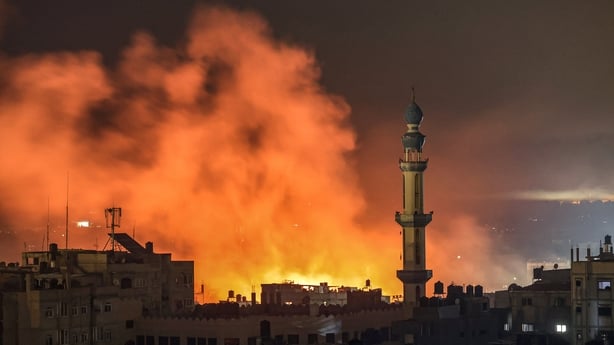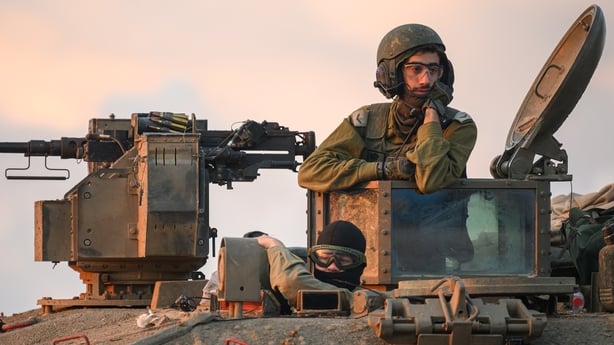The Israeli army said its troops shot and killed three hostages today after "mistakenly" identifying them as a threat.
"During combat in Shejaiya, the IDF (army) mistakenly identified three Israeli hostages as a threat. As a result, the troops fired toward them and they were killed," the army said in a statement.
"The IDF began reviewing the incident immediately...immediate lessons from the event have been learned, which have been passed on to all IDF troops in the field," it added, expressing "deep remorse over the tragic incident".
The army identified the hostages as Yotam Haim and Alon Shamriz, both taken from Kibbutz Kfar Aza during Hamas's 7 October attack, and Samer El-Talalqa, who was taken from Kibbutz Nir Am.
It said it was withholding the third hostage's name at the family's request.
Hamas kidnapped around 250 hostages during its 7 October attack on Israel, which killed 1,139 people, according to official figures.
Israel's retaliatory war against the group has killed more than 18,700 people, according to the territory's Hamas-run health ministry.
The Israeli government has repeatedly stated that bringing home all of the hostages is one of its chief war aims.
We need your consent to load this rte-player contentWe use rte-player to manage extra content that can set cookies on your device and collect data about your activity. Please review their details and accept them to load the content.Manage Preferences
US pressing for new 'precision' phase in Israel's war
Israel's war with Hamas will transition to a new phases focusing on the targeting of Hamas leaders on intelligence-led operations, after a US envoy pressed Israel to do more to reduce civilian casualties.
Washington has been pushing Israel to change its approach for weeks, as a global outcry over a spreading humanitarian catastrophe - with medical care crippled and food, fuel and drinking water widely unavailable - has intensified.
US National Security Adviser Jake Sullivan said today after "very constructive talks" with Mr Netanyahu that the war would transition to a new phase focused on precise targeting of Hamas leaders and on intelligence-driven operations.
Mr Sullivan told a news conference it would take months to achieve Israel's objectives in the war, but that fighting would proceed in phases, with a shift from the current campaign of heavy, widescale bombing and armoured ground operations that has been so deadly for civilians, including thousands of children.
"The conditions and the timing for that was obviously a subject of conversation I had with" Mr Netanyahu, other Israeli government leaders and military commanders, added Mr Sullivan.
He also said Washington wanted "to see the results" that match Israel's assurances that it distinguishes between civilians and militants.
Israel says Hamas uses civilians and civilian buildings as shields, an allegation it denies, but allies and adversaries alike, as well as the UN and humanitarian and rights groups, say Israel has done too little to protect non-combatants.

Israeli and Hamas forces battled throughout Gaza today, witnesses said, suggesting Israel's ground offensive was meeting stiffer resistance.
Residents in the small enclave reported fighting in Sheijaia, Sheikh Radwan, Zeitoun, Tuffah and Beit Hanoun in north Gaza, east of Maghazi in central Gaza and in the centre and northern fringes of the main southern city of Khan Younis.
Hospitals in Deir al-Balah, Khan Younis and Rafah reported a new influx of dead and wounded early today including two children.
Four people were killed in an Israeli air strike on a house in Rafah and Israeli tanks were shelling targets just east of the city near the Egyptian border, medics and witnesses said.
The Israeli military said in an update that its forces had destroyed a Hamas command and control hub in Gaza City's Sheijaia district, conducted a "targeted raid" on militant infrastructure in Khan Younis and bombed sites in the Rafah area that helped Hamas to smuggle weapons into Gaza.
The heavy fighting, confirmed by many residents and militant sources reached by Reuters, raised questions about whether Israel's two-month-long aerial and ground blitz of Gaza has significantly weakened Hamas, which it has vowed to annihilate.
"The Gaza Strip turned into a ball of fire overnight, we could hear explosions and gunshots echoing from all directions," Ahmed, 45, an electrician and father of six, told Reuters from a shelter in a central area of the densely populated enclave.
"They can destroy homes and roads and kill civilians from the air or through blind tank shelling, but when they come face to face with the resistance, they lose. We don't have anything to lose after all they had done to our Gaza," he said.
Unrelenting Israeli bombardment has laid much of the narrow coastal region to waste over the past two months.
Israeli Prime Minister Benjamin Netanyahu told Mr Sullivan yesterday that Israel would be at war with Hamas "until absolute victory".
This, defence minister Yoav Gallant said, "will last more than several months - but we will win and we will destroy them".
Read more about the Israel-Hamas conflict
There has been no sign of a halt in the hostilities, with Israeli assertions in late November to have largely subdued the heavily urbanised north of Gaza appearing to be a chimera.
However, Israeli government spokesperson Eylon Levy told a briefing today that Israel was "clearly winning the war right now" by having "significantly degraded Hamas' capabilities inside Gaza", noting a dramatic drop in rocket fire into Israel.
The spread of ground war after a week-long pause that enabled the release of 110 hostages has frustrated plans to step up deliveries of desperately needed basic supplies for civilians to survive as their homes have been destroyed.
Over 80% of Gaza's 2.3 million people have been displaced, some repeatedly.

'Desperate, hungry, terrified'
This week, the UN General Assembly overwhelmingly supported a non-binding resolution for a ceasefire in Gaza, with Washington voting against it.
The United Nations estimates 1.9 million of Gaza's 2.4 million people have been displaced.
The head of the UN agency for Palestinian refugees, Philippe Lazzarini, warned Gaza risked a "breakdown of civil order".
"Everywhere you go, people are desperate, hungry and are terrified," said Mr Lazzarini, who recently returned from Gaza.
According to UN humanitarian agency OCHA's latest update on the situation in Gaza, more than a third of households in the territory have reported experiencing severe hunger, while more than 90% are "going to bed hungry".
Adding to Gaza residents' desperation, mobile and internet communications were cut yesterday, according to Palestinian telecommunications company PalTel.
"Gaza is... blacked out again," PalTel said, with global network monitor Netblocks confirming the blackout.
Hamas's media office described the blackout as a "premeditated crime that deepens the humanitarian crisis" by making it harder for rescuers to reach injured people.
Even as the need for humanitarian assistance grows, aid distribution has largely stopped in most of Gaza, except on a limited basis in the Rafah area, according to the UN.
COGAT, the Israeli defence ministry body responsible for Palestinian civilian affairs, said the military "is enabling tactical pauses for humanitarian purposes".
One took place yesterday for four hours in a Rafah neighbourhood to allow civilians to restock supplies such as food and water, it said.
Fears of a wider regional conflagration persist, and Yemen's Huthi rebels yesterday claimed responsibility for an attack on a cargo ship through a Red Sea strait that is key to world shipping.

